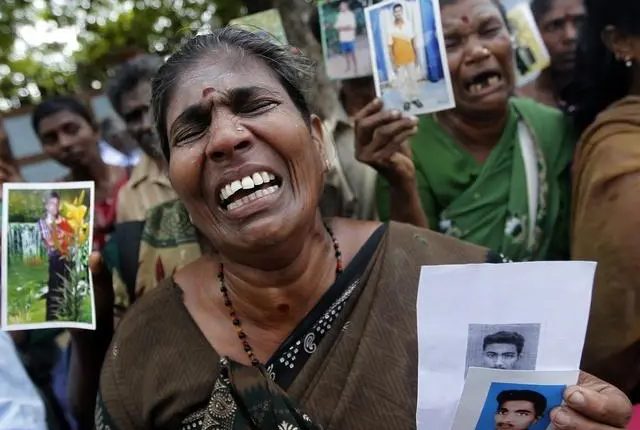By P.K. Balachandran
Of all the punitive measures that the UN Human Rights Council (UNHRC) might take against a recalcitrant Sri Lanka, sanctions under the Sri Lanka Accountability Project (SLAP) are most likely. Therefore, the SLAP is the sword Damocles over Sri Lanka’s head.
Under the SLAP, the UNHRC has been collecting, consolidating, analyzing and preserving information and evidence on human rights violations in the island nation. The plan is to “develop possible strategies for future accountability processes for gross violations of human rights or serious violations of international humanitarian law in Sri Lanka, to advocate for victims and survivors, and to support relevant judicial and other proceedings, including in Member States, with competent jurisdiction.”
The oral update by the High commissioner of Human Rights said: “I am pleased to report that the project team established in our Office to advance accountability has continued to make progress pursuant to resolution 51/1. It is in the process of providing concrete support to several jurisdictions which have ongoing criminal justice investigations. It is conducting proactive investigation work on key cases and collecting, consolidating, and analyzing information and evidence from a variety of UN and other sources, which is preserved in a repository so as to be used for future accountability initiatives. Victims remain at the heart of this work, including through our active engagement with victim organizations and civil society more broadly.”
However, the oral update added: “Fundamentally, it is the responsibility of the Sri Lankan authorities to directly acknowledge past violations and undertake credible investigations and prosecutions, alongside other accountability measures. But as long as this accountability deficit remains, the international community can – and should – play complementary roles.”
“The means to do so include use of accepted principles of universal and extraterritorial jurisdiction to investigate and prosecute alleged perpetrators, and support for the relevant accountability processes in third States, as well as a fair application of targeted sanctions against credibly alleged perpetrators.”
Even without being told by the UNHRC, Canada sanctioned former Lankan Presidents Gotabaya Rajapaksa and Mahinda Rajapaksa and the US sanctioned the former Lankan Navy Chief, Admiral Wasantha Karannagoda.
Gary Clyde Hufbauer and Barbara Oegg of the Peterson Institute for International Economics say in their 2000 paper that “targeted sanctions” or “smart sanctions”, like “smart bombs”, are meant to focus their impact on leaders, political elites and segments of society believed responsible for objectionable behaviour, while reducing collateral damage to the general population and third countries.
Targeted sanctioning is a limited exercise that does not impact large masses of people as the denial of GSP Plus trade concessions to Sri Lankan would do. But it has a huge impact on the morale of the people and the government of Sri Lanka. It damages the international stature of the country.
Targeted sanctions also do not hurt the sanctioning country as trade sanctions might. Denial of GSP Plus to Sri Lanka would not only hurt Sri Lanka but also buyers of Sri Lanka’s products in the US or European market. They would lose the advantage of buying low-priced but good products from Sri Lanka. This could be one reason why the European Union might not reject Sri Lanka’s request for the renewal of the GSP-Plus. The issue of renewal is to come up later this year.
Hufbauer and Oegg further say that the growing emphasis on the individual accountability of those in power for the unlawful acts of states (highlighted by the Pinochet case and the Bosnian war crimes trials), has made the concept of targeted sanctions attractive.
The Sri Lanka Accountability Project has a wider agenda than imagined. It not only covers war crimes but economic crimes, including corruption, which is endemic in countries like Sri Lanka. Curbs on and denial of normal democratic rights like free and fair elections are also included. The net is therefore very wide.
Recently, the US said that it would apply targeted sanctions if Bangladesh did not hold free and fair elections. The US said it would not give visas to people who prevented free and fair elections. This has hurt the Bangladesh ruling class who travel to the US frequently and have close ties with the US.
Earlier, the US had sanctioned several top officers of the Bangladesh Rapid Action Brigade (RAB) for frequent extra-judicial killings. Though Bangladesh protested, it had to rein in the rogue elements in the RAB and bring down the number of such killings drastically.
Recently, the International Criminal Court (ICC) issued an arrest warrant against Russian President Vladimir Putin, and its commissioner of children’s rights, Maria Lvova-Belova, for unlawfully deporting Ukrainian children to Russia. Although Putin and Lvova-Belova may not be arrested, the warrant cannot be dismissed as “symbolic” Kate Cronin-Furman, a lawyer and political scientist at University College, London, told New York Times.
According to Cronin-Furman, the ICC is hoping for reputational costs for Putin, material consequences in the form of travel restrictions, and deterrence.
“Probably not deterrence of the accused themselves — Putin or Lvova-Belova — but of other actors who are involved at a lower level in the crimes they’re accused of. Because the issuance of warrants suggests that more could be coming,” Croni-Furman said.
However, the success rate of targeted sanctions is rather low say Hufbauer and Oegg.
“In the 20 cases where they were imposed outside of comprehensive embargoes, only 5 can be judged partially successful, a rate of about 25 per cent. This is slightly below the success rate of 34 per cent for economic sanctions in general during the twentieth century.” – counterpoint.lk



Comments are closed, but trackbacks and pingbacks are open.